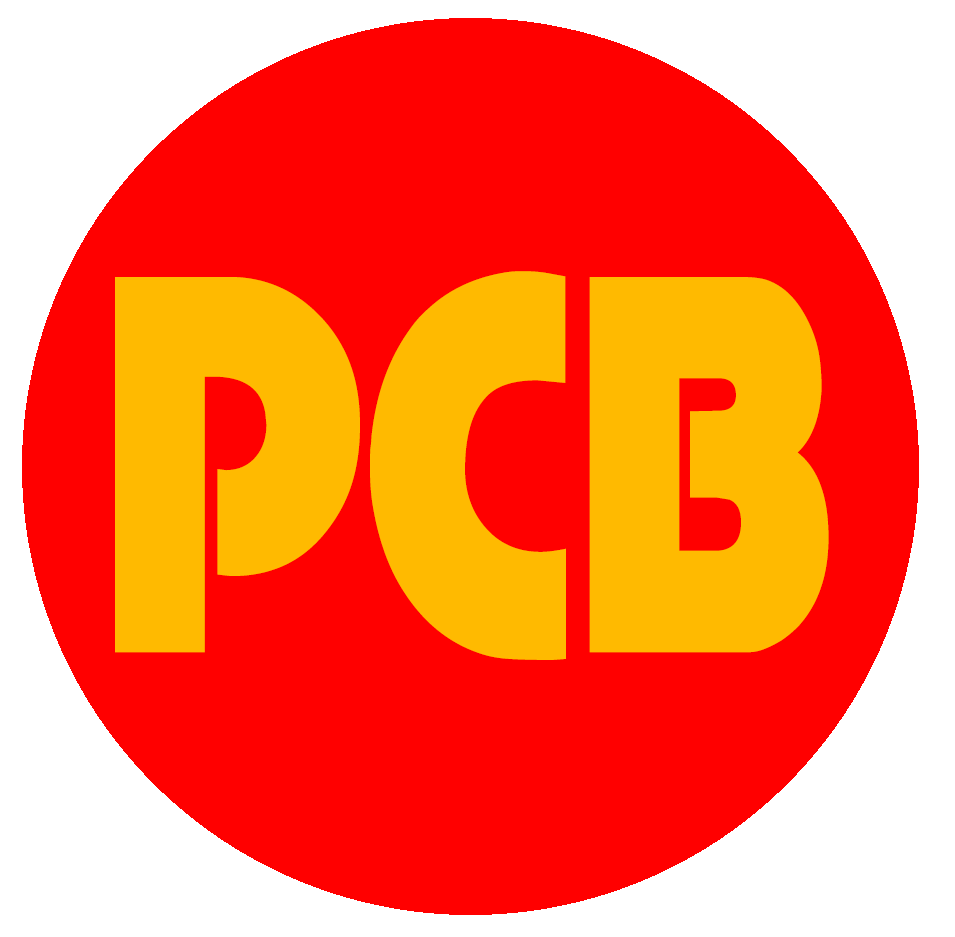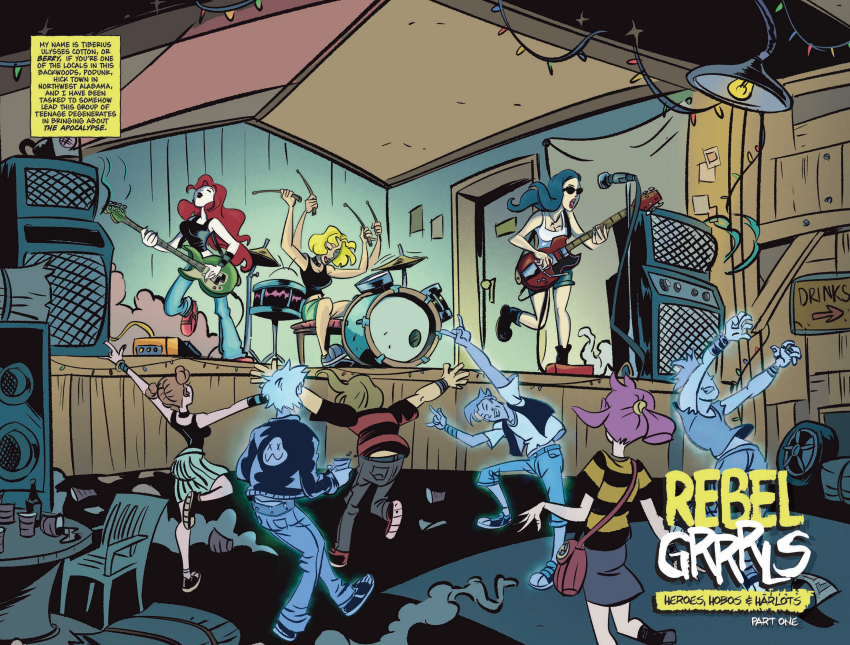By Keith Walsh
Inspired by experiences playing bass in punk bands in the Alabama scene, as well as his love of female-fronted bands in the Riot Grrrr movement, writer Danny Harrell (story, colors) joined with Robert Ahmad (pencils and inks) and Matt Krotzer (lettering) to create the new ‘Rebel Grrrls’ comic book published by Keenspot Entertainment. The series focuses on the adventures of an all girl band making waves in the Southern U.S., and has fantasy and horror elements in addition to tons of fan service for admirers of rock music and Grrl Power in general.
I caught up with Harrell, who lives in Muscle Shoals, Alabama, for an email exchange about this fun pop culture offering.
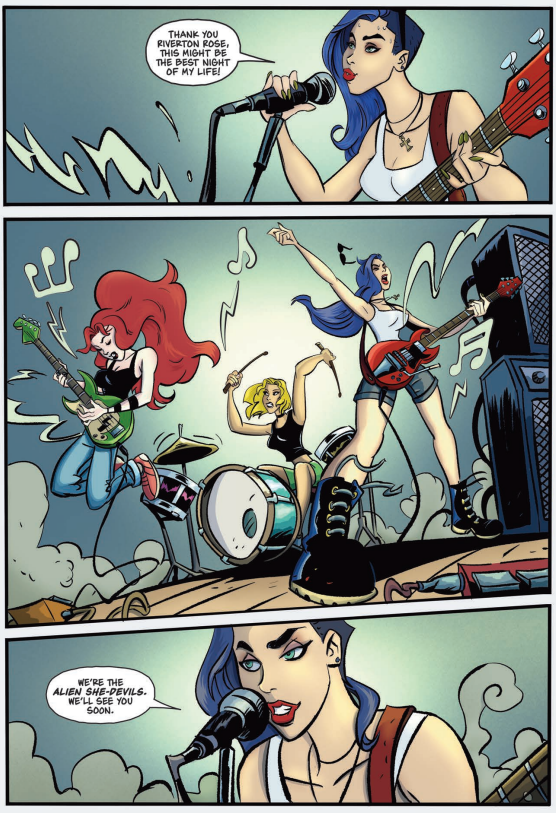
Popular Culture Beat: In the first issue there’s already lots of portrayal of misogyny against the protagonists. What other themes can we expect in future issues?
Danny Harrell: The book is influenced heavily by the Riot Grrrl movement in punk. Riot Grrrl was born out of a music culture where females had been called ‘jacket holders,’ and weren’t exactly welcomed at the front of the stage. Even before the Riot Grrrl movement started, female members of punk bands experienced misogyny within punk culture. Ari Up from The Slits was stabbed twice in the same year, and both were ruled as misogynistic hate crimes.
When the Riot Grrrl movement started, the bands wanted females within the punk scene to be able to express themselves like the boys were doing. They called out sexism within the punk scene and created the idea of “girls to the front” at their shows. They tackled sexism within the scene head on and with a ‘take no shit’ attitude. ‘Revolution girl style.’ And not just the bands themselves. The fans created and distributed zines, created art and whatever they could to get the message out. There were Riot Grrrl meet ups in different cities and people found out about them by being at shows, seeing flyers in music shops, etc. A total DIY movement. They had something to say and refused to not be heard.
The book Girls To The Front by Sara Marcus is a fantastic look at the Riot Grrrl scene and the struggles that bands and fans went through. The documentary The Punk Singer is another great look into the Riot Rrrrl movement.
All of that is a very long-winded way of saying that it would be impossible to write a story about an all-girl punk band without addressing the issue of misogyny within the music industry. As far as what’s to come, just stay tuned.
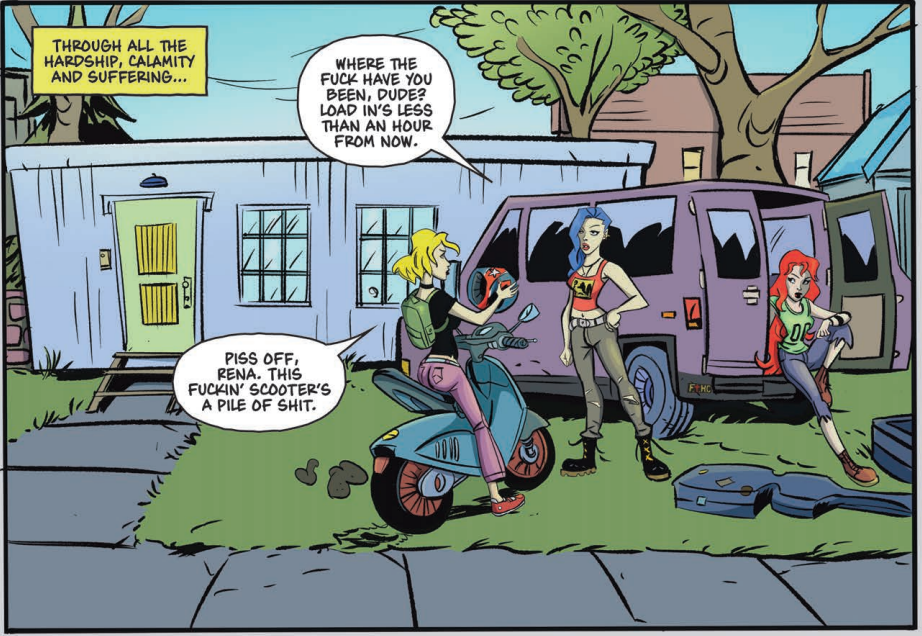
Popular Culture Beat: What are the digital tools you use to create the comic?
Danny Harrell: Robert uses Procreate for the pencils and inks. I use a combination of Procreate and Photoshop, but I lean more into Procreate for the most part. I’m not exactly sure what Matt used, but I believe it was Illustrator. I could be wrong about that, though.
Popular Culture Beat: Seems like there’s a definite color palette. What were some of the conversations around selecting the tones?
Danny Harrell: For color, my mind went to the look of stage lights in shitty dive bars. The light source is typically from harsh neon lights in those rooms. For the opening scenes and the closing moments of issue one, that’s where I wanted to go. Issue two has a similar feel in the first half of the issue, but the second half is a bit different because they are in a different location and setting. Lots of fire.
Popular Culture Beat: What bands in particular inspired the protagonists of ‘Rebel Grrrls?’
Danny Harrell: Bikini Kill is one of my favorite bands, and I feel like they inspired the choice of the band’s style of music. I mean, the series is named after one of their songs. There really wasn’t a specific band that I based the group off of, but I wanted them to be inspired by the riot grrrl bands of the early 90s. Bands like Bratmobile, Heavens to Betsy, Huggy Bear, The Frumpies and, of course, Bikini Kill. I wanted them to feel like they could’ve been apart of that scene.
In our local scene, we were lucky enough to have some really badass all girl punk bands, one of which, The Florence Nightingales, are mentioned in the book. Later on, some of the members of the Nightingales formed a band called She-Wolf, another killer punk band. I was lucky enough to share a bill with both of those bands on numerous occasions. I worked with two members of the Nightingales at a local coffee shop for several years. One of them actually introduced me to the girl who would end up becoming my wife.
Popular Culture Beat: What horror or fantasy comics inspired the stories?
Danny Harrell: When I wrote the script, I didn’t have any specific horror comics in mind. I’ve always loved Dark Horse and Vertigo comics, and after a lifetime of reading them, I’m sure they had some influence on my writing. The Goon is one of my favorite comics. The world that Eric Powell created with that series has always been super entertaining to me. Eric’s another southeastern fella.
I’ve always been a fan of comics with ensemble cast. Stuff like Doom Patrol, The Invisibles, Watchmen, Runaways, TMNT, etc. I love the idea of being able to tell the same story from different perspectives.
Popular Culture Beat: How did you, Robert and Matt find each other and decide to start working together? Where are you all located?
Danny Harrell: When I wrote the script for issue 1, I had a specific look in mind for the interiors. I really dug what Robert’s work on the book Headless, and felt his style would fit perfectly with what I wanted for the book. I reached out to him and he really liked the script. Robert is located in the U.K., and I’m from northwest Alabama, so all correspondence has been through email.
I had done some flat colors for issue 3 of a book called Dodge, and Matt was the letterer on it. I loved the way he did the sound effects on that series. With Rebel Grrrls being largely based around music, I knew that I wanted someone like him for issue 1. My buddy Mike Rooth put me in touch with him, and everything just kind of fell into place.
Popular Culture Beat: What’s your experience in the music industry, if any and how does it inform the stories and themes?
Danny Harrell: My original idea that I started with was that I wanted to find a way to tell some of the funny stories that had happened during my time playing bass in punk, garage rock and rockabilly bands over the last 25 years. The southeast is an interesting place to perform, and there are always interesting people at the shows.
I was thinking, ‘what type of band would receive the most resistance and push back while performing in the south?’ I landed on a feminist punk band. If a punk band in the south would have a hard time booking shows and building a fan base, an all-girl feminist punk band would have those issues times 1000.
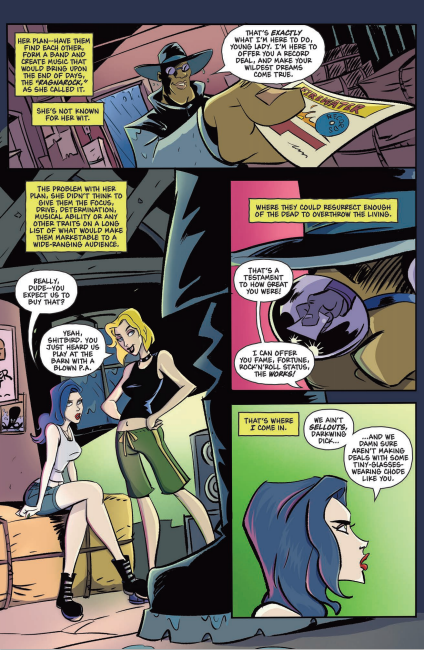
Popular Culture Beat: Do you expect any blowback from having an all male team creating stories about an all-girl rock band?
Danny Harrell: I don’t think so. I can’t speak from experience, as far as what females in the punk scene have gone through, and I’m not telling a story about events that actually happened to any specific individuals. This book is influenced by the Riot Grrrl bands and my love for that movement in punk rock, but I’m not trying to tell anyone’s specific story with this book. I’ve always been fascinated by that movement and wanted to learn as much as I could about it. I’ve always loved the attitude of that movement. They had a message and refused to back down from anyone. There’s a scene in The Punk Singer where Ian McKay is talking about the first time Bikini Kill came to D.C., and how that show was a game changer. I can’t recommend that documentary enough.
At the end of the day, I just want to make a fun and entertaining book. Sure, I’ve never been a female in a punk band, but I’ve also never been pursued by a record label or resurrected the dead through music or by any other means, so all of this is new to me. It’s all fantasy.
Popular Culture Beat: How do you defend the use of profanity throughout? Are you afraid it will limit your audience?
Danny Harrell: If you’ve ever been around teenaged punk kids, you’ll know that they say lots of naughty words. I just wanted the characters to feel authentic. I wanted the dialogue to feel like the conversations that I’ve had with other musicians, concert goers and friends. Maybe it says something about the company I keep, but we say lots of bad words.
It’s possible that it could limit the audience, but I’m not sure if there would’ve been many kids buying the book anyway. If someone who’s learning to read picks up the book, at least the words are easy, most of them only have four letters.
Popular Culture Beat: Will you ask the female artists who did some of the covers to take a larger role in doing the inner pages?
Danny Harrell: For the main storyline, Robert will be doing the interiors and I will be coloring them. I have a couple of spin-off, one shot stories that I want to tell, the first of which will be drawn by one of the female cover artist. Not because she’s a female, but because I love her work and really enjoy working with her. We’re hoping to start working on that book later this year or early next year, after she finishes the current series that she is drawing. The script is finished, we just have to find the right time to get going with it. Making a comic is extremely time consuming.
Popular Culture Beat: Where’s the best place to find your comics?
Danny Harrell: I always tell people to check with their local comic shops first. We need to support the local shops and keep them in business as long as we can. Ordering online will get you a book, but shopping at your local comic shop will get you the full comic experience. Think of it this way, going to a video store and renting a movie was a much more enjoyable experience than streaming one. If people don’t support their local shops, those places will go the way of the video and music stores. If you don’t have a local shop, or if your local shop is sold out, Keenspotshop.com has a limited number of each cover available.
Popular Culture Beat: Please tell me the story of how you got connected with Keenspot.
Danny Harrell: Keenspot has been around for years, and they have released a ton of books from some very talented creators. They started as an online hub for web comics in the early 2000s, and have grown into a really great publisher.
When I reached out to them about Rebel Grrrls, I sent them the script and the first 6 pages. I wasn’t sure if I would ever receive a response, so I was shocked when they reached out and said that they were interested in releasing the book. They have been great to work with. They give me the freedom to tell the story the way that I want to tell it. I’m thankful to have someone like them publishing the book.
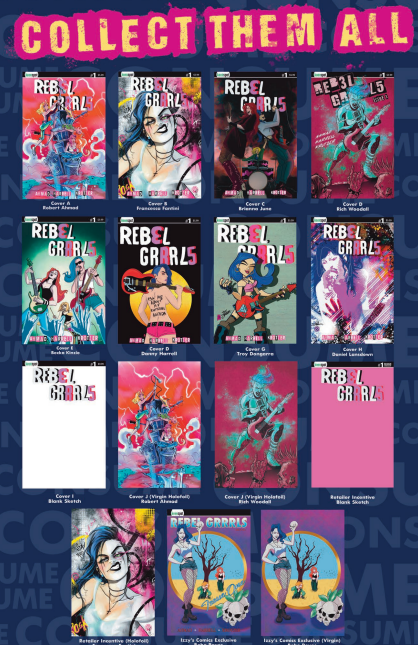
Danny Harrell Instagram
Keenspot Comics Dot Com
finis
